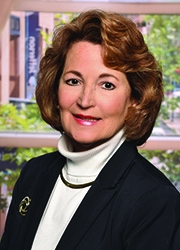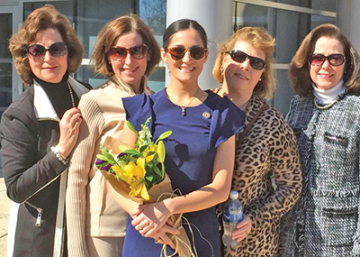Mary Beth Edger ’78

A mighty oak comes to mind when envisioning the family tree of Mary Beth Edger ’78 BSN, DNP, MSN, NHA, RN, NEA-BC, the current senior vice president for patient care services and chief nursing officer at Thomas Jefferson University Hospitals, Inc. In fact, the traits of longevity, strength, stability and endurance, that have long been symbolized by the oak, apply perfectly to Edger and her family of health care professionals, both by birth and by professional choice.
The roots of that majestic Edger family tree run deep in nursing and at Holy Family. Credit family matriarch Jean Donohoe Tribi for providing the strength and the example. “My mother was my advisor and my mentor for my entire life,” said Edger of Jean, the mother of seven and a labor and delivery nurse for almost 40 years who was present at most of the births of her 16 grandchildren, including at the birth of Mary Beth’s three children.
She lived to be 89 years old. “It was so important to her that I pursue a baccalaureate in nursing, when I showed an early interest in the field. She was wise enough to recognize the importance of education.”
“I enrolled at Holy Family University and I loved it,” Edger said. “My two sisters – Suzanne McCartney and Meg Donohoe – followed me to the Holy Family School of Nursing, and they loved it. When my daughter, Mary Elizabeth Berenbaum, graduated from Penn State and decided that she didn’t want to be a lawyer, which was her original path, I pushed her to enroll in Holy Family’s accelerated BSN program, and she loved it. It was easy for me to be the sales person for Holy Family. I liked that the numbers were a bit smaller and that you received a more personalized education plan.”

Edger, a self-described “continuous learner,” went on to earn two master’s degrees, a doctorate and a handful of certifications. She finds tremendous gratification as a leader in seeing her colleagues reach career milestones that they thought were unattainable.
“I’m always pushing education and encouraging people, including my daughter, to advance their degrees,” said Edger, whose mother-in-law, sister-in-law and two nieces also made their marks in the profession. “It just provides more opportunity for you. It improves your leadership skills. I was always motivated to do that, and I always had my immediate family, and especially my husband, encouraging and supporting me. I tell the people that I am mentoring to just take it a day at time, and I tell them that they can do it. It’s very gratifying to see your team grow and develop.”
Edger finds plenty of other moments for gratification in her current role where she oversees three Thomas Jefferson University Hospital campuses. Ultimately, the goal is to improve the experience and the outcome for the patient.
“I try to make a difference every day,” she said. “Each day, I have a plan, but that often changes because you need to prioritize. When I first took this role, the pandemic was just starting. My entire team and I were there day in and day out, fit testing, rearranging schedules, taking nurses that were in other areas and trying to help them be a part of an ICU team, because so many patients were in critical care. We had to change our orientation onboarding and learning to virtual. We lived through a lot together. We learned a lot. After that, we all experienced the great resignation. We lost people in all kinds of roles, including people in industry who would bring our products and supplies. When we had shortages, we improvised and we substituted and somehow we all got through.”
That time, Edger admits, was the toughest time in her storied career.
“I learned that I was resilient,” she said.
“I learned that I still have that drive to keep going. I led a team, and together we really increased the collaboration with all the disciplines – the medical staff, the respiratory therapist, the physical therapist, everybody. We worked together as a team. We were driven, and we didn’t give up. The biggest thing is that each day, as a nurse, we make a difference in somebody’s life.”
Edger has now turned her attention to the next challenges, which will be designing future patient care models and finding innovative ways to address critical nursing shortages.
“It’s tough to be a leader these days,” she said. “It’s really scary to think in the next several years we expect to see less and less acute care in hospital nursing. We are not there yet. A lot of nurses, because of the burnout, because of the death and critical illness that they saw through the pandemic, have left the bedside. The world has changed, but the pandemic wasn’t just a lost cause. It actually gave us an opportunity to do things differently and to do them better. It gave us time-saving measures and the growth of telemedicine and the virtual nurse. At Jefferson, we have created a role called the Nurse Emeritus, where we are calling on retired nurses to help us out with projects, with mentoring new staff. They still have experience and expertise, and we can’t afford to lose that.”
Because those people - like Mary Beth Edger, her mother, and the long line of nurses in her family - are deep-rooted in the profession and have learned how to be strong in the face of adversity, how to stand their ground and how to weather the storms of life - just like the mighty oak.
